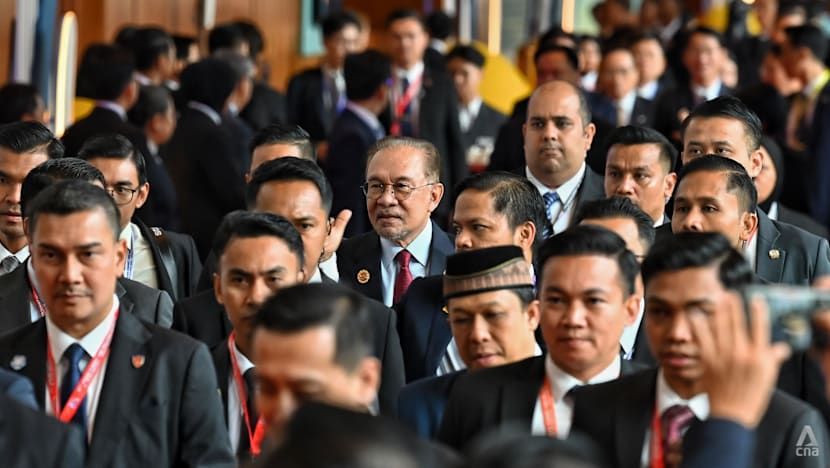World
Anwar’s ASEAN Chairmanship: Diplomacy Shines, Results Mixed

Prime Minister Anwar Ibrahim has leveraged Malaysia’s chairmanship of the Association of Southeast Asian Nations (ASEAN) to enhance his diplomatic stature and that of his nation on the global stage. This year’s chairmanship, however, raises questions about the tangible achievements of the bloc under his leadership, especially concerning trade and pressing regional issues such as the ongoing conflict in Myanmar and disputes in the South China Sea.
Analysts point out that while the recent ASEAN Summit and Related Meetings held from October 26 to 28, 2023, provided a platform for discussion, many significant agreements were reached bilaterally rather than through ASEAN’s mechanisms. Khoo Ying Hooi, an academic at Universiti Malaya, described Anwar’s tenure as “symbolically strong but substantively mixed.” She emphasized that while Anwar has restored a sense of visibility and moral authority to ASEAN, the outcomes thus far have not been as impactful as anticipated.
Anwar’s emphasis on “cooperation over confrontation” highlighted his diplomatic approach. Yet, this rhetoric did not lead to breakthroughs on critical issues, particularly regarding Myanmar, which has been embroiled in crisis since the military coup in early 2021.
Anwar’s Diplomatic Engagements at the ASEAN Summit
During his chairmanship, Anwar made strategic use of his role as host, culminating in high-profile visits from global leaders, including Donald Trump. The summit was notable for its attendance, featuring leaders from various nations including Chinese Premier Li Qiang, Australian Prime Minister Anthony Albanese, and Brazilian President Luiz Inácio Lula da Silva. Political scientist Syaza Shukri noted that Anwar’s efforts in bringing these leaders to Malaysia have bolstered confidence in his leadership.
At the conclusion of the summit, Anwar symbolically handed over the ASEAN chairmanship to Philippine President Ferdinand Marcos Jr., who will officially assume the role in 2026. Anwar’s welcoming of Trump was particularly significant, as the former president had attended only once before, during his first term in 2017.
The summit also served as a backdrop for important agreements, including a joint declaration on peace and security between Cambodia and Thailand, which was witnessed by both Anwar and Trump. This declaration emerged after tensions between the two nations escalated, leading to military clashes earlier this year.
While Trump described the agreement as the “Kuala Lumpur Peace Accord,” the Thai Foreign Minister refrained from using that term, indicating a more cautious approach to the deal. Nonetheless, the dialogue represented a crucial step toward resolving regional tensions.
ASEAN’s Role in Global Diplomacy
Despite Anwar’s diplomatic successes, questions linger about ASEAN’s effectiveness as a negotiating body. Observers have noted that while ASEAN serves as a venue for international engagements, significant negotiations often occur outside its framework. Syaza pointed out that many key agreements between the US and Southeast Asian nations were finalized on the sidelines of the summit rather than through ASEAN-led discussions.
The East Asia Summit (EAS), which involves major powers including the US and China, also failed to produce a joint statement, highlighting the overshadowing influence of great power competition over ASEAN’s mechanisms. Joanne Lin, co-coordinator of the ASEAN Studies Centre at the ISEAS-Yusof Ishak Institute, noted that while Anwar’s hosting style effectively managed various interests, the challenge remains for ASEAN to evolve from being a mere host to an active participant in shaping deals.
Concerns have also been raised regarding the fairness of trade agreements made during the summit. Deborah Elms, a trade policy expert, highlighted that some agreements appeared to favor US interests disproportionately, requiring ASEAN countries to adjust their domestic policies significantly.
Despite the foreign policy challenges, Anwar’s international engagements have not translated into unequivocal domestic support. Opposition parties have criticized his welcoming of Trump, particularly in light of the US’s controversial role in the Gaza conflict. Protests against Trump’s visit reflected a segment of public sentiment that views such diplomatic moves as misaligned with local concerns.
Analysts suggest that while Anwar may have gained traction internationally, the impact of his ASEAN chairmanship on his domestic political standing remains uncertain. As Azmi Hassan from the Nusantara Academy for Strategic Research noted, the disparity between Anwar’s global reception and domestic approval indicates a complex political landscape.
In navigating these intricate dynamics, Anwar’s leadership during Malaysia’s ASEAN chairmanship may have positioned him favorably on the international stage, but the road ahead for both him and ASEAN will require addressing the critical issues that resonate with constituents at home.
-

 Business5 months ago
Business5 months agoKenvue Dismisses CEO Thibaut Mongon as Strategic Review Advances
-

 Lifestyle5 months ago
Lifestyle5 months agoHumanism Camp Engages 250 Youths in Summer Fest 2025
-

 Sports5 months ago
Sports5 months agoDe Minaur Triumphs at Washington Open After Thrilling Comeback
-

 Sports5 months ago
Sports5 months agoTupou and Daugunu Join First Nations Squad for Lions Clash
-

 Top Stories5 months ago
Top Stories5 months agoColombian Senator Miguel Uribe Shows Signs of Recovery After Attack
-

 Health5 months ago
Health5 months agoNew Study Challenges Assumptions About Aging and Inflammation
-

 World5 months ago
World5 months agoASEAN Gears Up for Historic Joint Meeting of Foreign and Economic Ministers
-

 World3 months ago
World3 months agoSouth Korea’s Foreign Minister Cho Hyun to Visit China This Week
-

 Business5 months ago
Business5 months agoOil Prices Surge Following New EU Sanctions on Russia
-

 Entertainment5 months ago
Entertainment5 months agoDetaşe-Sabah Violin Ensemble Captivates at Gabala Music Festival
-

 Business3 months ago
Business3 months agoStarling Bank Plans Secondary Share Sale, Targeting $5.4 Billion Valuation
-

 Entertainment5 months ago
Entertainment5 months agoBaku Metro Extends Hours for Justin Timberlake Concert









